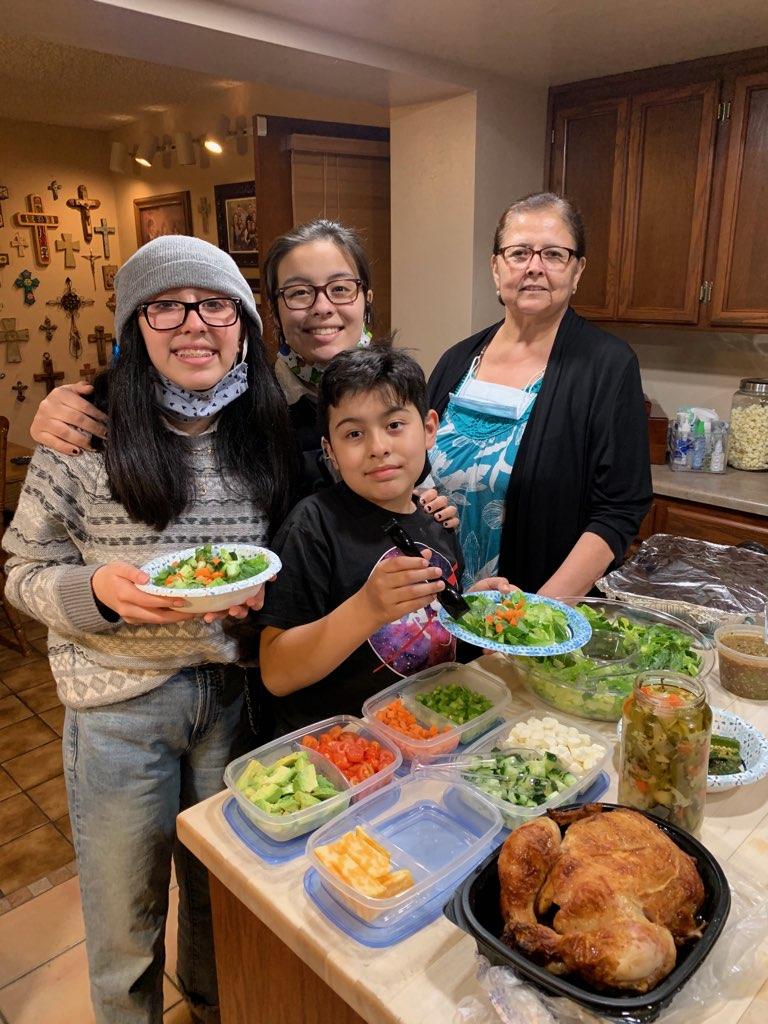Healthy Habits
Cooperative Extension Diabetes Prevention Program helped Tucson resident, family
Family Sunday meal.jpg

Tucson resident Frances Diaz believes everything happens for a reason. When her knee pain became so severe that she could no longer kneel at church, she saw an orthopedic surgeon who told Frances that she would require surgery.
The weight she had gained over the past years was adding a lot of pressure on her joints and the surgeon mentioned that “cutting through a thick layer of fat” would make the surgery more complicated. Frances didn’t want to go under general anesthesia, and she refused to be sidelined for six weeks of post-operation recovery.
“What! La Franchesca’s Taxi can’t be out of service for that long because I have a few people that depend on me getting them around town,” Frances recalls thinking.
Around the same time, Frances received concerning news about her health: her blood glucose levels made her one of the 88 million adults in the United States who have prediabetes. She was told that losing weight would help reduce her risk for diabetes. The fear of these growing health problems weighed down the strong shoulders of a career woman who had raised two children and is now involved in the lives of her six grandchildren’s after school and weekend activities. Frances realized she needed to take charge of her health.
The surgeon recommended Frances lose 25 pounds. “Twenty-five pounds! She just threw that number out there like it was nothing,” Frances says. Wanting to lose weight was not new. Frances had tried many diets, but none had worked. She knew she needed help but didn’t know where to find it.
Frances read about the University of Arizona Cooperative Extension Diabetes Prevention Program and decided to join the Pima County classes. The classes introduced her to multiple strategies to help her become healthier.
She was encouraged to keep track of what she ate, and how much she moved. Frances also learned ways to reduce stress and improve sleep. She started measuring and writing down in detail what she was eating. By doing so, she began to realize how much she ate. Frances learned to still enjoy her favorite foods, but to eat them in smaller portions while adding more vegetables to her plate. Besides changes in diet, Frances increased her physical activity, going on walks after dinner.
In the classes, she received support from the lifestyle coach and other program participants, but at home it took her husband a few weeks to notice that Frances was serious about this new healthy lifestyle. After washing all her measuring cups and spoons every day he started to notice that Frances was learning to make healthy choices. He realized she was serious about the food that was brought into the house and she believed in what she was doing. These changes encouraged him, her children and grandchildren to support her new healthy lifestyle.
Slowly, Frances’ new habits led to weight loss. Her husband, children, and grandchildren started to lose weight too. Their support of Frances included adopting a healthier lifestyle themselves.
Last year, the family took a summer trip to New York City. They all had pedometers and made it a game to see who got more steps in each day. Instead of taking the subway, they decided to walk from place to place. They made it a goal to take 20,000 steps a day. In addition to seeing more of the city this way, they were able to avoid any vacation-related weight gain.
After joining the University of Arizona Cooperative Extension Diabetes Prevention Program and losing 19 pounds, Frances’ knee pain was gone. Even better: she no longer required knee surgery. Her blood glucose levels went down, and she no longer has prediabetes. Her doctor told her “Whatever you are doing, don’t stop!”
Frances believes much of her success was thanks to her family joining in on her lifestyle change program. After Frances joined the program the family started to enjoy healthier meals on their weekly Sunday dinner. And when they go to church, Frances is proud to report that she now kneels on both legs.
Update: Frances hasn’t been getting together with her family as frequently during the COVID-19 pandemic, but after losing 19 pounds on the program she has lost another 10 pounds. She continues to measure and write down in detail everything she eats.
The University of Arizona Cooperative Extension Diabetes Prevention Program is offered across the state to anyone at risk for type 2 diabetes. It is offered in both English and Spanish. In 2020, over 160 people participated in the program working with trained lifestyle coaches to improve their diet and become more active. To date, participants have lost a total of over 1500 pounds. Visit www.preventdiabetesAZ.org to learn more and to sign up.

